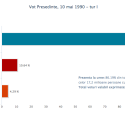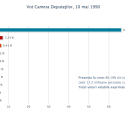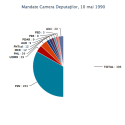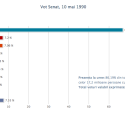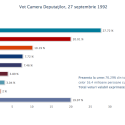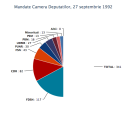IMPORTANT DEVELOPMENTS
- ECONOMY. The USL Government lowers the VAT for bread products.
- FINANCE. Romania concludes a new precautionary agreement.
- ECONOMY. An increased number of institutions confirm Romania’s positive perspectives.
- EUROPEAN FUNDS. The USL Government significantly increases EU funds absorption.
- IMF AGREEMENT. The recently concluded agreement with the IMF shows Romania’s resolve to continue financial reforms.
1. The Government has approved the VAT reduction on bread to 9%
The Government has approved the VAT reduction on bread to 9%, from September 1, thus USL respected another promise made to the Romanians during the election campaign! The measure aims at implementing a reduced VAT rate of 9% for the supply of bread, wheat, and flour.
“The measure seams to tackle tax fraud in trading bread, and the reduced rate applies throughout the chain of production and distribution”, noted Victor Ponta. The Prime Minister said he would call for the bread producers’ associations to demonstrate in reasonable terms that the reduction of the VAT will help reduce tax evasion. He also showed that the success of this project would make the extension of VAT reduction possible also to other staple foods.
“We have the VAT reduction on food – on bread. I say food because I rely on the fact that since this is a partnership between the Government and the producers, it will be proven that what I said all along, namely that a 9% VAT does not mean less money to the budget, it means tackling tax evasion and even additional revenues or lowering the price of bread. If this first project will prove successful, then it means that next year, or when we will have the necessary conditions, we can extend it to other staple foods”, said the Prime Minister.
The PM stressed the importance of supporting the producers, but also the consumers, so that this measure to be a successful one. “It is very important not to be alone, not just the Government, but also the producers. And, after all, each of us who buy a bread, should ask for the receipt for that bread”, said Victor Ponta.
The main purpose of the measure is not reducing the price for bakery products, but to tackle tax evasion in the field, which, according to some studies, rises to 80%, one of the highest in the entire economy.
It is possible to reduce the price of bread, but this is not related to the Government. The Government cannot interfere in the market to establish the prices. There is a lot of positive feedback from the market, which explains the benefits of this measure.
Rompan representatives see the decision as a “historic” one, and Price Waterhouse Coppers recommends expanding the measure to other products, given its potential beneficial effects. Romalimenta said that those who will benefit from this measure are the consumer and the state budget.
2. Romania concludes a new precautionary agreement with the European Commission and the IMF
The Romanian authorities have agreed with the International Monetary Fund (IMF) and the European Commission (EC) on a two-year precautionary deal, which will amount to four billion euros, equally shared by the two international financial institutions, the standby agreement following to be discussed by the IMF board in autumn.
“A few days ago, there were difficult, long negotiations with our international partners, but ultimately, successful. I intend, on one hand, having, of course, the EC and IMF permission, to give to the public, for the first time, the memorandum with the EC and the cover letter with the IMF. You know that when we were in the opposition we requested this, now we are in power. I asked, with their short-time approval – perhaps tomorrow or when possible – to make these public, these are not secret things”, said Victor Ponta.
Besides publishing the cover letter with the IMF and the memorandum with the CE, PM Victor Ponta announced that, in the beginning of the parliamentary session, he intends to present to the Parliament the terms of the new agreement.
Andrea Schaechter, the head of the IMF delegation to Romania, spoke about the terms of the new standby agreement. “The EC, the IMF and the World Bank held talks with the Romanian authorities, which requested that the program to be over two years. The Romanian authorities intend to treat the agreement as a precautionary one, do not want to withdraw from financial resources (…) At the technical level, we have reached an agreement, but the standby deal has must be approved by the IMF board, during a meeting scheduled in autumn”, said Andrea Schaechter, the chief of the IMF mission in Romania.
Andrea Schaechter added that the Government has expressed its determination for a second objective: to facilitate a sustainable economic development, together with the IMF, the World Bank and the European Commission
3. Romania’s economic perspectives are increasingly favorable
The National Romanian Bank has revised the economic growth forecast for this year to more than 2%, based on the positive evolution of exports, industrial production and a good agricultural year. Also, BNR lowered the monetary policy interest rate from 5% to a historical low of 4.5%. Exports increased by 4.6% in the first quarter of 2013, and a 3-4% increase for this year seems possible.
Industrial production increased by 4.7% during January-March 2013, sectors such as transport, electrical equipment and chemicals recording increases of up to 10%. Agricultural production could advance by about 4-5% in 2013, after a disastrous decline of 22% in terms of volume, recorded last year.
In 2013, the Government, in cooperation with BNR, creates the prerequisites for economic recovery. International institutions recognize and confirm the economic progress from the last period, claiming that Romania’s recovery continues to accelerate, in the context of current macroeconomic stability.
According to a Financial Times analysis, Romania is currently one of the most successful economies in the European Union, registering a growth of 2.2% in the first quarter of 2013, and an economic expansion of at least 2% in 2013 seems achievable, making our country a performer among peers in the region.
From a macroeconomic point of view, Romania is stable, becoming a more attractive destination for foreign investment. The economic model applied by the USL Government proves to have beneficial effects. All these considerations and positive results clearly demonstrate that while some seek scandal and instability, the USL Government fulfills its commitments towards the Romanians and takes Romania out of the worst crisis that our country has been pushed in by the PDL Governments.
4. Romania significantly increases European funding absorption rate
More than 700 million Euros worth of European funds was brought to Romania in July only. The USL took over the Government after six years of Romanian presence in the European Union, with an absorption rate of 7% and almost all sectorial operational programs blocked. The USL government has managed to increase the absorption rate threefold and unlocked the programs brought to a standstill by PDL. The current absorption rate is approx. 21%.
In other words, during the PDL Governments, the average annual absorption was 1.16%, while under the USL Government this average is of 14%! The absorption in July is the highest recorded in a single month, since Romania receives structural funds from the EU.
With this important cash flow from the EC, Romania is able to direct money to other priority areas. The USL has actuated very fast the field of EU funds. Several European authorities have officially acknowledged the Government’s progresses in this field.
5. The agreement concluded with the IMF underlines the progress of the USL Government
The IMF has improved the growth forecast for Romania in 2013 to 2%. The Government of Romania will sign a new standby agreement with the IMF and the EC, amounting to 4 billion euros. The two international institutions involved will contribute equally to this sum.
Representatives of the Romanian government emphasized that the funds are only a reserve in case of a severe economic crisis. The IMF has improved Romania’s economic growth forecast for this year to 2% in 2013 and to 2.25% for next year. It is a new signal confirming that Romania is on the right track.
The IMF recognized the progress made recently, claiming that Romania’s recovery continues to accelerate in the context of the current macroeconomic stability. It was also noted that the exports have increased, as agricultural production was much better than last year, and that inflation will decrease.
Our international partners also praised the good results of the previous agreement, concluded successfully by the USL Government successfully. All these considerations and positive results clearly demonstrate that while some seek scandal and instability, the USL Government fulfills its commitments towards the Romanians and takes Romania out of the worst crisis in recent history.



